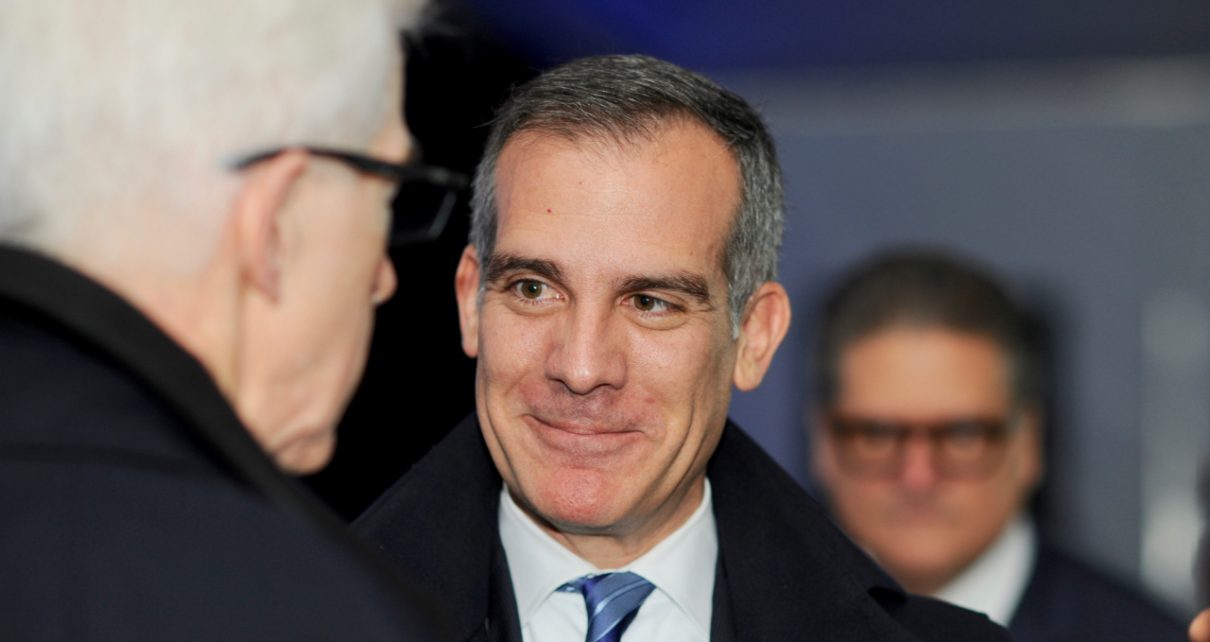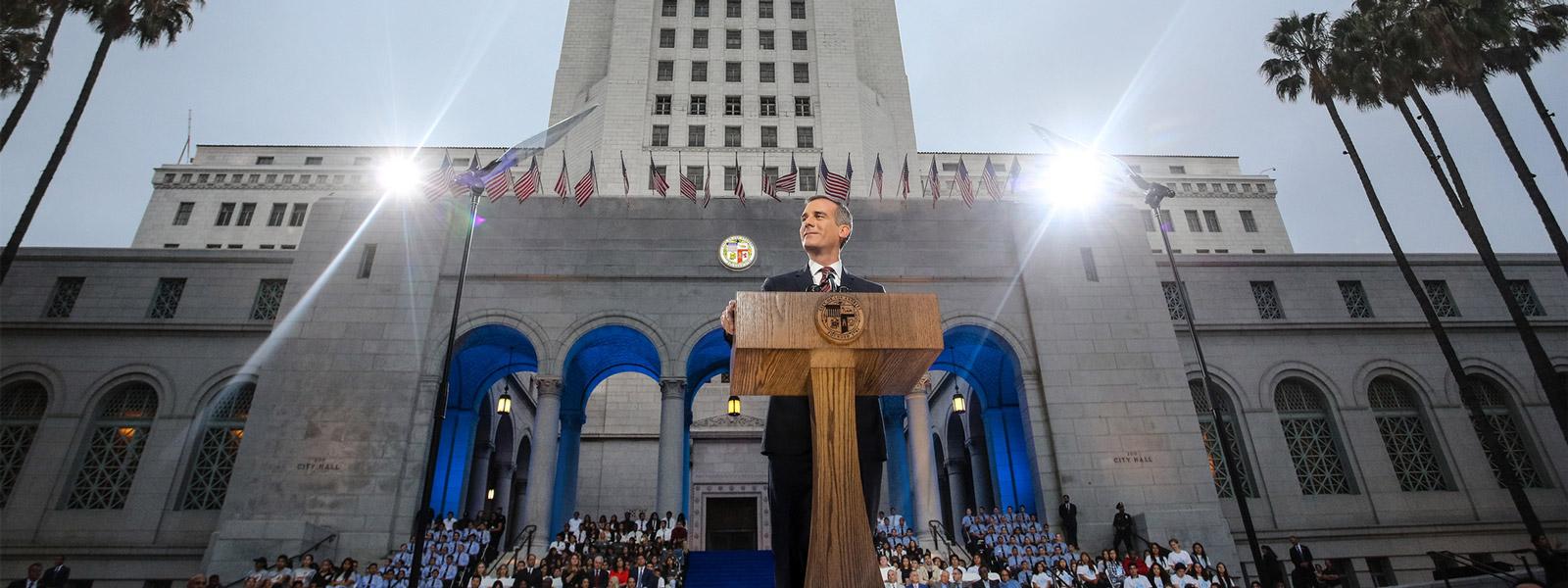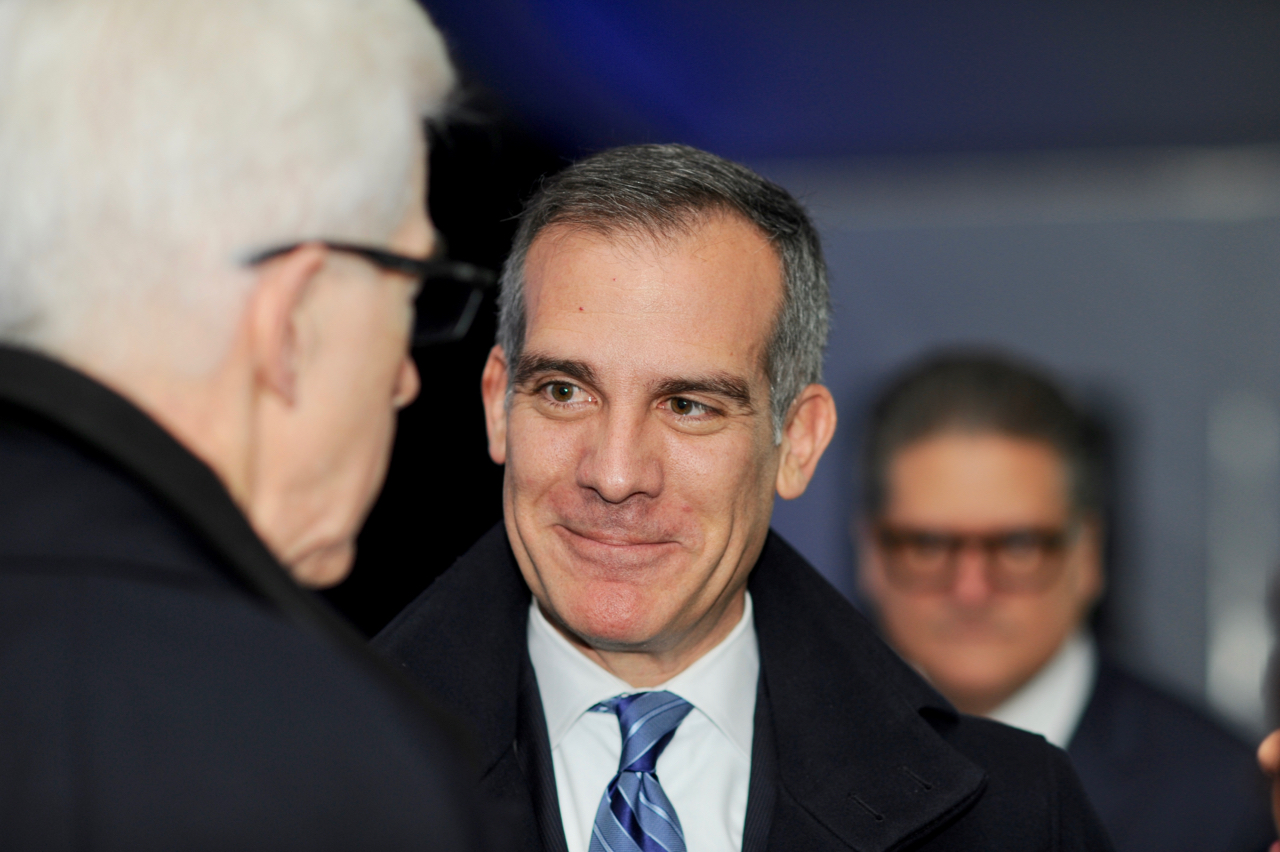
Los Angeles Mayor Eric Garcetti. (Photo: Kevin Sanders for California Globe)
LA Mayor Garcetti Signs Major Road Speed Change Ordinance Into Law
177 miles of LA roads are to be reduced in speed by 5 miles per hour by next month
By Evan Symon, March 7, 2022 7:11 pm
Los Angeles Mayor Eric Garcetti signed into law an ordinance that reduces speed limits on 177 miles of streets on Monday, reversing limit increases set by an older statewide policy.
The decision to introduce a large number of lowered speed limits dates back to 2018. That year, a state law based on annual “speed surveys” of roads in the state found that 94 miles of roads in Los Angeles required a speed limit raise due to the majority of vehicles being clocked had a higher than normal average speed than what was listed. Despite many Los Angeles lawmakers being up in arms about the decision, the changes were made.
That action, as well as a 21% increase in traffic deaths since the changes were made in the ensuing years, led Assemblywoman Laura Friedman (D-Glendale) to write AB 43 last year. Designed to give more speed limit control to local entities, as well as other actions such as regulating state highway speed limits more and giving CalTrans great control in setting speed limits in some areas as well, the bill quickly garnered support in both houses.
“The City of Los Angeles was forced to increase speed limits across the city because of an arcane state law that allows speeders to set the speed limit,” said Assemblywoman Friedman in a statement last year. “It’s a flawed policy that’s had devastating consequences. Recklessly fast driving has only increased, resulting in a 21% uptick in traffic fatalities in the city in 2021.”
Passed and eventually signed into law in October 2021 by Governor Gavin Newsom, cities across the state quickly sprang into action once AB 43 came into effect in January. The Los Angeles City Council proposal on reducing speeds by 5 miles per hour on 177 miles of roads quickly advanced through the City Hall chambers in the last few months. In a matter of weeks, it moved up through committees and was eventually passed by the Council on February 22nd.
On Monday, Garcetti signed it into law officially, with the reductions to be made official a month from now. In a statement, Garcetti reiterated what Friedman and City Councilmembers had said about higher speeds leading to more accidents and how the speed limit reduction measure, which was compiled from Los Angeles Department of Transportation (LADOT) data on areas with higher accidents and greater risks, would reduce them.
“No parent should worry about their child going to school,” said Mayor Garcetti on Monday. “No older adult should feel unsafe when they walk around her neighborhood. These are no accidents, it’s just that simple, and we know that the odds of dying of a traffic collision is higher at a greater speed. In fact, it goes up exponentially.”
LADOT also praised the signing on Monday, with Department General Manager Seleta Reynolds saying “As humans, we’re not designed to survive an encounter with a moving vehicle going faster than 40 miles an hour. The day that we had to take that action of increasing speed limits on 200 miles of streets was an extremely dark day for those of us at the Department of Transportation and advocates everywhere who spend all of our time, energy and talent and treasure trying to change those statistics, trying to save those lives.”
Transportation and traffic experts noted that while the speed reductions would ultimately make streets safer, it may not trickle down to drivers as much as city officials hope it will.
“Most drivers believe there is a buffer of 5 to 10 miles per hour that they can go before the police do anything since breaking the speed limit by that much may not be worth the pulling over,” explained Vaughan Swoboda, a traffic researcher who helps gather traffic information from 22 states and 3 Canadian provinces for university use, to the Globe on Monday. “It’s good that LA saw the need to reduce speed limits in certain areas, but it sounds like they didn’t put many things into account. So there’s the drivers that go above anyway with that ‘buffer,’ there are those who flat out ignore it, with more people looking at phones there are more distracted drivers, and then there are many who still have the old speed limit still ingrained in them and won’t change.”
“To make a difference, there needs to be a big media blast before the speed limit changes hit, the LAPD and other law enforcement needs to be instructed to pull people over with closer speed limits to send a message, and for streets with lower speed limits, place speed bumps. And that’s just to start. Otherwise, all this effort will have been made for nothing. It’s only a 5 miles per hour change, but it can mean the world. Plus, it being successful there could influence other Californian cities to make changes too. Successful changes always have imitators.”
The speed limit changes are expected to be changed in full on all the listed roads by April 7th.
- Bill to Require Law Enforcement Disclosure if AI Was Used To Help Write Reports - August 7, 2025
- Gov. Newsom Files FOIA Request To ‘Expose True Cost’ Of L.A. Federal Troop Deployment for Anti-ICE Riots - August 6, 2025
- California Redistricting: How Newsom’s Plan Will Demolish Hard Fought GOP Gains - August 6, 2025




This has probably been written so that the city can collect more revenue from speeding tickets, not for the reasons they say. And it seems such changes cause more traffic problems and accidents, not fewer. I clearly remember driving on a major street in a midwestern city that had been recently changed from 35 to 30 and the reduced speed didn’t match road or traffic conditions. People don’t drive naturally in these speed traps; they become paranoid and over-cautious. I’ll be curious to see if traffic accidents go UP, not DOWN because of this nonsense, and how many more very expensive speeding tickets are issued.
I believe that’s right, Showandtell. We had one road in the city posted at 35mph. It was very difficult to keep that speed going downhill so there were lots of speeding tickets being given out. One of our friends got ticketed twice in a week. She’s the wife of the former mayor and she was upset. She went to city hall and complained that the speed limit was too low for that road and the conditions – well paved, wide and well lit. A short time later the speed limit was raised to 45mph. I will admit that being the wife of the former mayor probably made a difference.
Traffic fatalities in 20:21 were up because due to the anti-police phobia and defund the police Democrat policies, police officers didn’t go out on a limb and make a lot of traffic enforcement stops. You can see traffic lawlessness rampant all over L.A. I stopped counting at 35 the number of single occupant cars passing me in the car pool lane on the 405 freeway the other day. Stop signs are but a suggestion, especially to cyclists. So, the 21% increase in fatalities is not because of speed limits.
The increase in fatalities can be directly linked to marijuana use. Look it up. But don’t expect law makers to care.
Ordinances like the diamond lanes and speed limits are meaningless if they’re not enforced. The bureaucrats can increase ticketing quotas on the officers, which will result in public resentment toward the police. Perhaps this is part of their plan?
Traffic citation quotas are illegal in CA.
Abe, since when has something being “illegal” stopped these bureaucrats?
Is there a place where we can see the list of streets?
TBM, click on the link in the last sentence of the article —- “all the listed roads” —- and a document will come up for you.